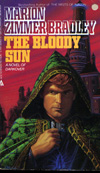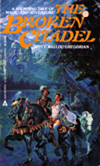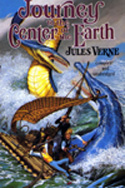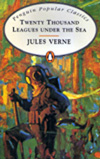FANTASY / SF
Well, you may have gathered from the children's book list that I like my fantasy novels 8). So they get another page, although they do have to share it with sci-fi.
 I'll
start with Marion Zimmer Bradley's The Bloody Sun. I actually
don't like any of her other novels and the reason I like this one doesn't
have anything to do with her writing! I like it because it's set on the
planet of Darkover which has a ruling caste of redheads, the Comyn. One
glimpse of red hair and the ordinary people are grovelling in the street,
providing clothes, goods, and services for free, vacating tables in crowded
restaurants to make room for redheads...this is my planet!! One day, the
world will be like this - people will bow and scrape before us redheads
8)
I'll
start with Marion Zimmer Bradley's The Bloody Sun. I actually
don't like any of her other novels and the reason I like this one doesn't
have anything to do with her writing! I like it because it's set on the
planet of Darkover which has a ruling caste of redheads, the Comyn. One
glimpse of red hair and the ordinary people are grovelling in the street,
providing clothes, goods, and services for free, vacating tables in crowded
restaurants to make room for redheads...this is my planet!! One day, the
world will be like this - people will bow and scrape before us redheads
8)
J oyce
Ballou Gregorian: a sequence of three novels, The Broken Citadel,
Castledown, and The Great Wheel. I inherited the first of these
books from a flatmate of my sister's, and instantly began a lengthy hunt
for the other two. They're great - trashy, but great. The first book starts
when 11-yr-old Sibby Barron climbs through a window in a deserted house
near her home in Boston, and finds herself in another world, like our
own but different: desert dwellers are whiter than white, the dark-skinned
people are those living in the far north. She finds magic, monsters, good
friends, and a shattering secret about herself. In the second book, my
favourite, Sibby is 18, and called back to this world from her Harvard
student life; and in the third, in her thirties she is brought back to
a world devastated and reeling from attacks by a Hun-like army. But this
time Sibby has returned with no memory of her previous visit, and she
becomes sword-bearer to the
oyce
Ballou Gregorian: a sequence of three novels, The Broken Citadel,
Castledown, and The Great Wheel. I inherited the first of these
books from a flatmate of my sister's, and instantly began a lengthy hunt
for the other two. They're great - trashy, but great. The first book starts
when 11-yr-old Sibby Barron climbs through a window in a deserted house
near her home in Boston, and finds herself in another world, like our
own but different: desert dwellers are whiter than white, the dark-skinned
people are those living in the far north. She finds magic, monsters, good
friends, and a shattering secret about herself. In the second book, my
favourite, Sibby is 18, and called back to this world from her Harvard
student life; and in the third, in her thirties she is brought back to
a world devastated and reeling from attacks by a Hun-like army. But this
time Sibby has returned with no memory of her previous visit, and she
becomes sword-bearer to the
Down the Long Wind, by Gillian
Bradshaw, is just fantastic. It's a retelling of the Arthurian story
in three books, Hawk of May, Kingdom of Summer, and In Winter's
Shadow. The central character is Gwalchmai, second son of the king
of the Orkneys, who escapes t he
clutches of his witch-queen mother Morgawse and manages to become accepted
as a member of Arthur's warband. He fights for Arthur, attempting to restore
the peace and order of Roman Britain, and sees the decline and final destruction
of Arthur's kingdom.
he
clutches of his witch-queen mother Morgawse and manages to become accepted
as a member of Arthur's warband. He fights for Arthur, attempting to restore
the peace and order of Roman Britain, and sees the decline and final destruction
of Arthur's kingdom.
These books are beautifully written, descriptive but not wordy, and Bradshaw takes the essence of the familiar characters from the Arthurian romances and makes them real, down-to-earth people. Arthur is a hassled king, constantly under pressure and frustrated with the tribal chiefs who refuse to co-operate in his dream of restoring civic order. Bedwyr (who is the Lancelot of the story), Gwenhyfar, Gwalchmai himself, and Arthur's half-brother Cei, are real and interesting, with their own problems and motivations. And Morgawse and her other son Medraut (Mordred) are genuinely terrifying. The stories are told by different voices: Gwalchmai narrates the first, his servant, Rhys, the second, and Gwenhyfar herself relates the story of how her infidelity with Bedwyr acts as the catalyst for Arthur's downfall and the destruction of the world they spent so long trying to build. The first-person narrative is very absorbing, very involving: I cried my eyes out at the end! Highly recommended if you're into Arthurian stories.
Robert Jordan's Wheel of Time sequence
- six billion readers ca'n't be wrong! 8) Actually I must confess I have
given up reading these...round about book six I decided I wasn't going
to keep shelling out £8 a pop for books that were only advancing the story
arc inch by inch. I hate the way fantasy writers these days spin out stories
into six, seven, eight, nine books - okay, so people want to keep reading
about these characters, but when you've already spent £50 and the story
is only half-way along you start to get a bit fed up. I'm not criticizing
Robert Jordan - this seems to be an industry trend now, and why should
he or any other fantasy writer stop, when clearly people are willing to
keep paying? More power to them. 
That rant aside, these books are actually
worth the money. They focus on Rand, a young farmer, who finds that he
can draw on saidan
I abandoned the story when it was getting really interesting: not interesting enough, though, that I yearn to get back into it. It's like a soap - while you're watching it you're interested in the characters' lives but once you make the break you couldn't care less. I'd like to find out what happened to Rand but not enough to plough through another six huge books. But if anyone can give me a reasonably quick synopsis starting from Book Six...mail me! Please! 8)
Can I make another small rant? Of course
I can, this is my web page. I read and really enjoyed the first three
of Raymond E Feist's Midkemia books, Magician, Silverthorn,
and A Darkness at Sethanon
Moving to sci-fi, I have twin gods of science
fiction - Ray Bradbury and Kim Stanley Robinson. Ray Bradbury,
of course, is a classic sci-fi  writer,
with such wonderful, imaginative books as The Martian Chronicles,
The Illustrated Man, Dandelion Wine, and Fahrenheit 451.
He has such interesting ideas, an his writing is so clear, so simple and
direct, that he is a hard act to follow. But I put KSR right up there
with him. My favourite book of his is The Memory of Whiteness,
a strange, fascinating book about a blind musician, a secret religion,
and music based on physics, which mimics the movement of atoms so perfectly
that listening to it we can see the future. There is an irritating, intrusive
authorial voice, which actually addresses us as "Dear Reader", but once
you get over this, The Memory of Whiteness is well worth reading.
writer,
with such wonderful, imaginative books as The Martian Chronicles,
The Illustrated Man, Dandelion Wine, and Fahrenheit 451.
He has such interesting ideas, an his writing is so clear, so simple and
direct, that he is a hard act to follow. But I put KSR right up there
with him. My favourite book of his is The Memory of Whiteness,
a strange, fascinating book about a blind musician, a secret religion,
and music based on physics, which mimics the movement of atoms so perfectly
that listening to it we can see the future. There is an irritating, intrusive
authorial voice, which actually addresses us as "Dear Reader", but once
you get over this, The Memory of Whiteness is well worth reading.
I have only read one part of his Orange County trilogy, Pacific Edge, but I expect the other books are as good as this one and I look forward to reading them. But his great contribution to sci-fi literature is the terraforming trilogy, Red, Green, and Blue Mars. Set in the future, when real control of Earth has passed out of the hands of politicians and into those of huge transnational corporations, a group of one hundred scientists from all over the world heads off to Mars as the first colonists. When they get there, argument flares between those who want to get on with the terraforming process as fast as possible and those who think they should study Mars as it is before they change its face forever. The books trace the paths of these First Hundred, the terraforming, and subsequent events on Mars as there is a rush to colonize it, to escape from overcrowded Earth. Radicals seek Martian independence; the transnats struggle to retain control of Mars to exploit its resources. KSR spent 17 years researching these books and it shows. He appears to have mastered every science known to man 8). His detailed descriptions of the terraforming process, Martian flora, the attempts to create an atmosphere, are completely authentic and fascinating. If Mars is colonized, these books could be the blueprint for its terraforming. For those of us here on Earth, they provide a convincing (and terrifying) view of how earth could be not very far in the future.
Another great science writer is Philip K Dick, on whose books the films Bladerunner and Total Recall were based. Like Ray Bradbury, his short stories are simply written and incredibly imaginative. He takes the stuff of B-movies and makes it scary and believable - for example, in The Father-Thing a child feels there is something a little odd about his father, and when he investigates he discovers his dead father and a discarded skin in the barn, and replicas of his mother and himself growing in cocoons in the bushes. His deadpan treatment of such bizarre stories makes you forget for a moment that they *are* bizarre. Reading a collection of his stories all at once will wreck your head, but it's a lot of fun.
I have two final favourites in this category,
one in fantasy and one in sci-fi, both from the 19th century. My fantasy
writer is E A Poe: I'm not sure if he really fits in this category,
since he also wrote the forerunner to Sherlock Holmes, the detective C.
Auguste Dupin. But he wrote enough strange stories - The Fall of the
House of Usher, the Masque of the Red Death - and gems like The
Tell-Tale Heart, The Cask of Amontillado, and The Black Cat,
that I feel I can put him in here. He also wrote one of my all-time favourite
poems, The Raven. Wonderful, rolling language
that trips off the tongue. 

My sci-fi writer is the incomparable
Jules Verne, author of 80 Days Around the World, From the Earth
to the Moon, Journey to the Centre of the Earth, and 20,000 Leagues
Beneath the Sea. These are such fun to read, with that marvellous
19th century trick of making page-turners out of books with stilted dialogue,
stiff characters, and a culture totally unlike our own. The characters
in these books are memorable, and indeed are embedded in the public consciousness:
elegant, determined Phileas Fogg, bowler-hatted Passepartout
